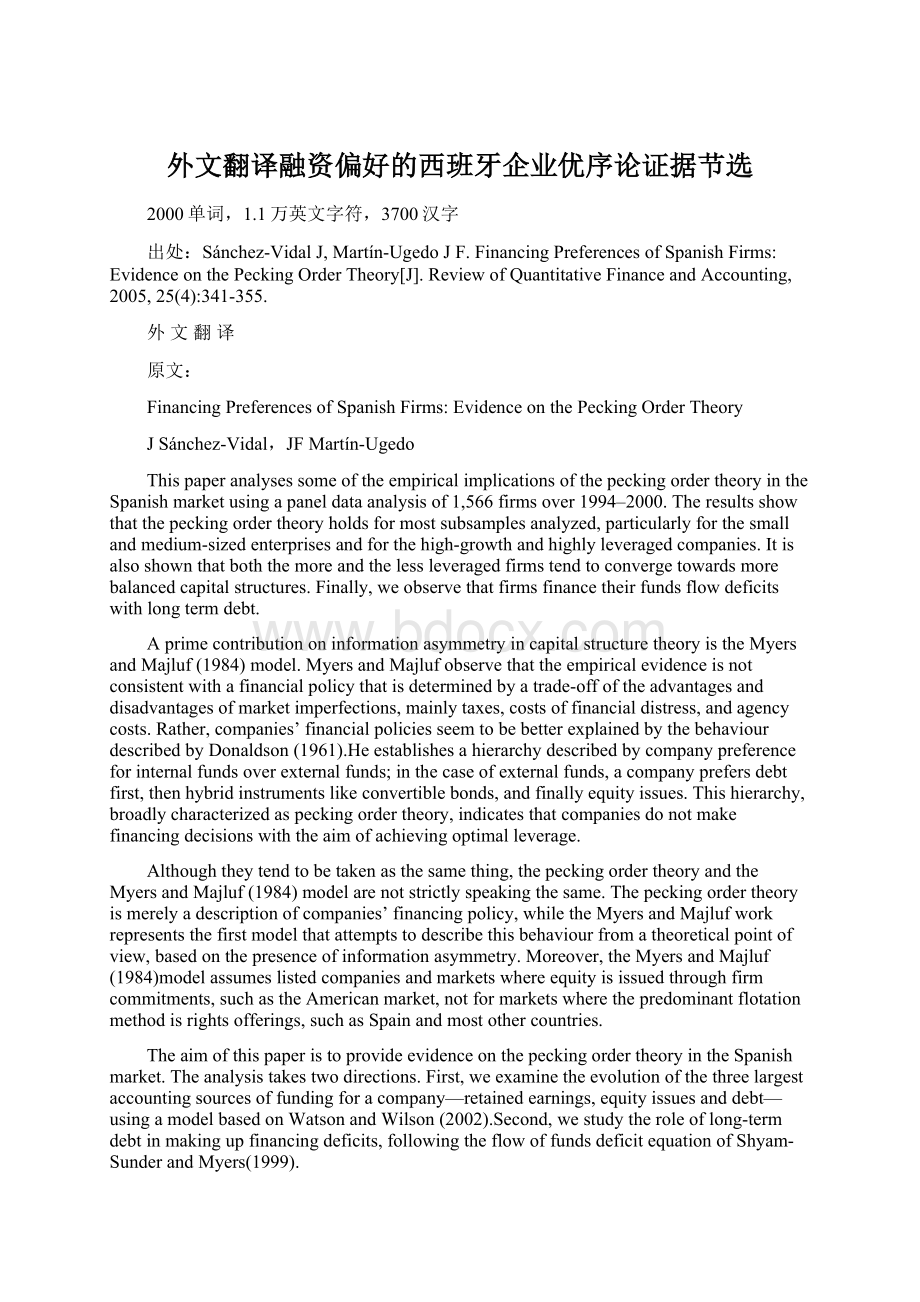外文翻译融资偏好的西班牙企业优序论证据节选.docx
《外文翻译融资偏好的西班牙企业优序论证据节选.docx》由会员分享,可在线阅读,更多相关《外文翻译融资偏好的西班牙企业优序论证据节选.docx(8页珍藏版)》请在冰豆网上搜索。

外文翻译融资偏好的西班牙企业优序论证据节选
2000单词,1.1万英文字符,3700汉字
出处:
Sánchez-VidalJ,Martín-UgedoJF.FinancingPreferencesofSpanishFirms:
EvidenceonthePeckingOrderTheory[J].ReviewofQuantitativeFinanceandAccounting,2005,25(4):
341-355.
外文翻译
原文:
FinancingPreferencesofSpanishFirms:
EvidenceonthePeckingOrderTheory
JSánchez-Vidal,JFMartín-Ugedo
ThispaperanalysessomeoftheempiricalimplicationsofthepeckingordertheoryintheSpanishmarketusingapaneldataanalysisof1,566firmsover1994–2000.Theresultsshowthatthepeckingordertheoryholdsformostsubsamplesanalyzed,particularlyforthesmallandmedium-sizedenterprisesandforthehigh-growthandhighlyleveragedcompanies.Itisalsoshownthatboththemoreandthelessleveragedfirmstendtoconvergetowardsmorebalancedcapitalstructures.Finally,weobservethatfirmsfinancetheirfundsflowdeficitswithlongtermdebt.
AprimecontributiononinformationasymmetryincapitalstructuretheoryistheMyersandMajluf(1984)model.MyersandMajlufobservethattheempiricalevidenceisnotconsistentwithafinancialpolicythatisdeterminedbyatrade-offoftheadvantagesanddisadvantagesofmarketimperfections,mainlytaxes,costsoffinancialdistress,andagencycosts.Rather,companies’financialpoliciesseemtobebetterexplainedbythebehaviourdescribedbyDonaldson(1961).Heestablishesahierarchydescribedbycompanypreferenceforinternalfundsoverexternalfunds;inthecaseofexternalfunds,acompanyprefersdebtfirst,thenhybridinstrumentslikeconvertiblebonds,andfinallyequityissues.Thishierarchy,broadlycharacterizedaspeckingordertheory,indicatesthatcompaniesdonotmakefinancingdecisionswiththeaimofachievingoptimalleverage.
Althoughtheytendtobetakenasthesamething,thepeckingordertheoryandtheMyersandMajluf(1984)modelarenotstrictlyspeakingthesame.Thepeckingordertheoryismerelyadescriptionofcompanies’financingpolicy,whiletheMyersandMajlufworkrepresentsthefirstmodelthatattemptstodescribethisbehaviourfromatheoreticalpointofview,basedonthepresenceofinformationasymmetry.Moreover,theMyersandMajluf(1984)modelassumeslistedcompaniesandmarketswhereequityisissuedthroughfirmcommitments,suchastheAmericanmarket,notformarketswherethepredominantflotationmethodisrightsofferings,suchasSpainandmostothercountries.
TheaimofthispaperistoprovideevidenceonthepeckingordertheoryintheSpanishmarket.Theanalysistakestwodirections.First,weexaminetheevolutionofthethreelargestaccountingsourcesoffundingforacompany—retainedearnings,equityissuesanddebt—usingamodelbasedonWatsonandWilson(2002).Second,westudytheroleoflong-termdebtinmakingupfinancingdeficits,followingtheflowoffundsdeficitequationofShyam-SunderandMyers(1999).
ThereareseveralfeatureswhichdistinguishtheSpanishfinancialsystemfromtheAmericanone.Probablythemaindifferenceaffectingthepeckingorderistheflotationmethodinequityissues.Equitysecuritiesareissuedinawidevarietyofways,mainlyfirmcommitmentsunderwrittenoffersandrightsissues.Therelativeimportanceofthesemethodsdependsontheissuingfirm’scountry.IntheUnitedStatesrightsofferingshavedeclinedinfrequency,havingvirtuallydisappearedby1980.InSpain,rightsprevail.Thisdifferencemayplayanimportantroleinthehierarchydescribedbythepeckingordertheory.Inaddition:
(a)debtfinancingisprimarilyraisedprivatelyinSpanishfirms,thusbanksplayaveryimportantrole;and(b)theSpanishcapitalmarketislessdevelopedthantheAmericansecuritiesmarket,havinglowercapitalizationandsmallertransactionvolumes.AlthoughseveralpapershavealreadyexaminedthecapitalstructureofSpanishfirms,mostofthemhaveanalyzedtheeffectofdifferentvariablesonleverage.However,thereislittleevidencefocusingonpeckingorderandnostudyemployingtheWatsonandWilson(2002)methodology.
Theresultsshowthatsmallandmedium-sizedcompaniesbehaveconsistentlywithpredictionsofthepeckingordertheory.Whenwedividethesampleintosubsamplesonthebasisofgrowthandthelevelofleverage,weseethathigh-growthcompaniesbasetheirgrowthonretainedearnings,andfirmswithveryhighandverylowdebtratiostendtoconvergetowardsmoremoderatedebtratios.Estimationoftheflowoffundsdeficitequationshowsthatfunddeficitsaremetbytheuseoflong-termdebt.
Thepeckingordertheorydescribesahierarchyincompanies’financialpolicyasfollows:
(1)Firmsprefertofinancetheirinvestmentswithfundsinternallygenerated,namely,retainedearningsanddepreciationexpenses;
(2)firmsbasethedividendpayoutratiosonthefutureinvestmentopportunitysetandtheirexpectedcashflows;(3)payoutratiostendtobestickyintheshortterm,soinsomeyearsinternallygeneratedflowswillbeenoughforfinancingcompanyneedsandinsomeyearsnot;(4)fundsobtainedinyearsoffinancialsurpluses,afterpaymentofdividendsandfinancing,aredirectedtofinanceshort-termfinancialinvestmentsortoreducedebt.Whenthereisafinancialdeficit,firmswillseekexternalfinance:
firstdebt,thenhybridsecuritieslikeconvertiblebonds,andfinallyequityissues.
ToexplainthisbehaviourMyersandMajluf(1984)constructamodelofinformationasymmetryassumingthatfirmmanagersactonbehalfofcurrentshareholders.Ifcompanieshaveenoughfinancialslack,theywillcarryoutallinvestmentsthathaveapositivenetpresentvalue.Ifexternalfundsareneededtofinancenewinvestments,themarketwillinterpretequityissuesasevidencethatcompanysharesareovervaluedandthusissueannouncementwillhaveanegativeimpactontheshareprice.
Thus,MyersandMajluf(1984)arguethat,ifthecompanydoesnothaveenoughfundstofinancenewinvestments,itwillissueequityonlywhenthereareveryprofitableinvestmentsthatcanneitherbepostponednorfinancedthroughdebt,orwhenmanagersbelievethatthestockisovervaluedenoughthatshareholderswillbedisposedtotoleratethemarketpenalty.Theinformationasymmetrymaycausecurrentshareholderstorenouncepositivenetpresentvalueinvestmentprojectsinordertoavoidadropinsharepriceduetotheissueofequity,therebycreatinganunderinvestmentproblem.Toavoidtheseresults,itseemsreasonablethatcompanieswillimplementfinancingpoliciesthatallowthemthecapacitytofinanceinvestmentsandavoidexternalfinancing.
However,theMyersandMajlufmodel(1984)hassomelimitations.ThefirstisthatitappliestomarketsliketheAmericanmarketwheresharesareofferedmainlythroughfirmcommitmentunderwritingsandnotthroughrightsissues,whichistheflotationmethodthatprevailsinmostothermarkets.Inanunderwrittenfirmcommitment,sharesareofferedsimultaneouslytothepublicatlarge.Thus,ifsharesareovervalued,therewillbeawealthtransferfromnewtocurrentshareholders.Inrightsofferings,currentshareholdersenjoypriorityinthepurchaseofnewshares,whichminimizesthepossibilityofwealthtransfers.Therefore,theMyersandMajluf(1984)argumentthatequityissueisthelastchoiceinfirms’financingpolicieshaslittlecurrencyinmarketswhererightsissuesaretheprevalentmethodofequityissue.
AnotherlimitationoftheMyersandMajluf(1984)modelisthatitisgenerallyintendedtodescribelistedcompanies,leavingtherest,mainlythesmallandmedium-sizedenterprises(SME),outoftheexplanation.Becauseofthis,authorssincethenhavetriedtoexplainthepeckingordertheoryusingalternativeargumentsappropriatetonon-listedSMEcompanies.
AmajorprobleminSMEfinancing,especiallyinnon-Anglo-Saxoncountries,islimitedaccesstocapitalmarkets(afinancegap)(HolmesandKent,1991).FinancingchoicesforSMEarethususuallyreducedtoretainedearningsandbankloans.Thisfinancegapcanbedividedintotwocomponents:
asupplygap,becauseoflimitedavailabilityoffundsorhighercost,andaknowledgegap,becauseoflimitedknowledgeaboutallthepossibilitiesofexternalfinanceandalackofawarenessoftheadvantagesanddisadvantagesofdebt.Asaconsequenceofthesetwocomponentsofthefinancegap,themainlong-termsourceoffinancewillbeinternalfinancingand,ifnecessary,bankloans.
Anotherfactorthatmayplayapartinthehierarchyoffirmchoicesisthemotivationtoretaincontrolofthefirm(HolmesandKent,1991;HamiltonandFox,1998).Aswehavenoted,inafirmcommitmentofferingstockissoldatonetimetothegeneralpublic;thus,currentshareholders’relativeownershipoffirm,aswellastheircontrolofthecompanymaybediminishedwithnewshareofferings.Suchacontrolproblemmayarisealsoinrightsissues,buttoalesserextent,becausecurrentshareholdersmayhavelimitedfundstoinvestinthefirstplaceormaywanttodiversifytheirinvestments,sotheymightnotpurchaseadditionalsharestomaintaintheirownershippercentage.Asaresultofallofthis,thecurrentshareholderswouldalsobereluctanttoissueequity.
ThesefactorsmentionedaboveimplyasimilarhierarchytotheonedescribedbyMyersandMajluf(1984);thatis,thecompanywouldmakeuseofretainedearningsinthefirstplace,thendebt(bankloans)and,finally,equityissues.
Variousauthorshavetriedtotesttheempiricalimplicationsofthepeckingordertheory.Next,webrieflysummarizesomeofthem.WatsonandWilson(2002)useadescriptivemodelintheBritishmarketandconfirmthepeckingordertheory,especiallyforclosely-heldcompanies(companieswhoseownershipisveryconcentratedandwhosemanagerisu